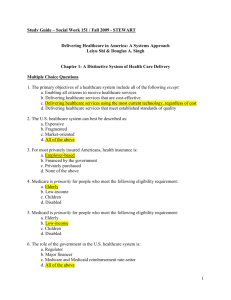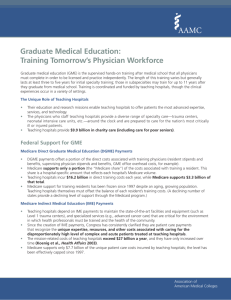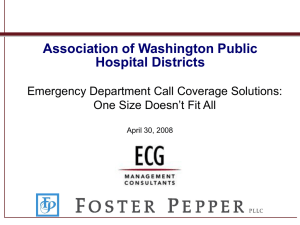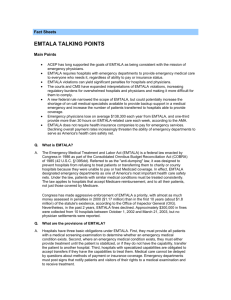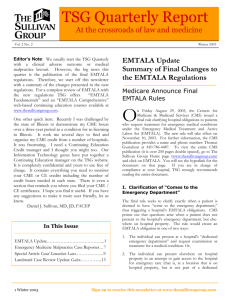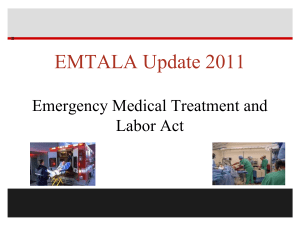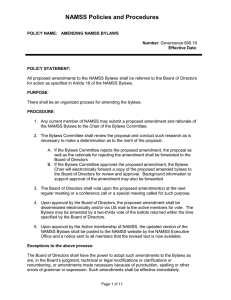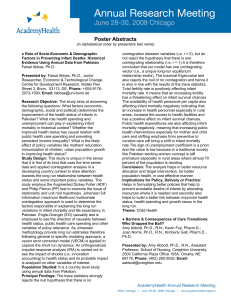Healthcare Regulatory Requirements
advertisement
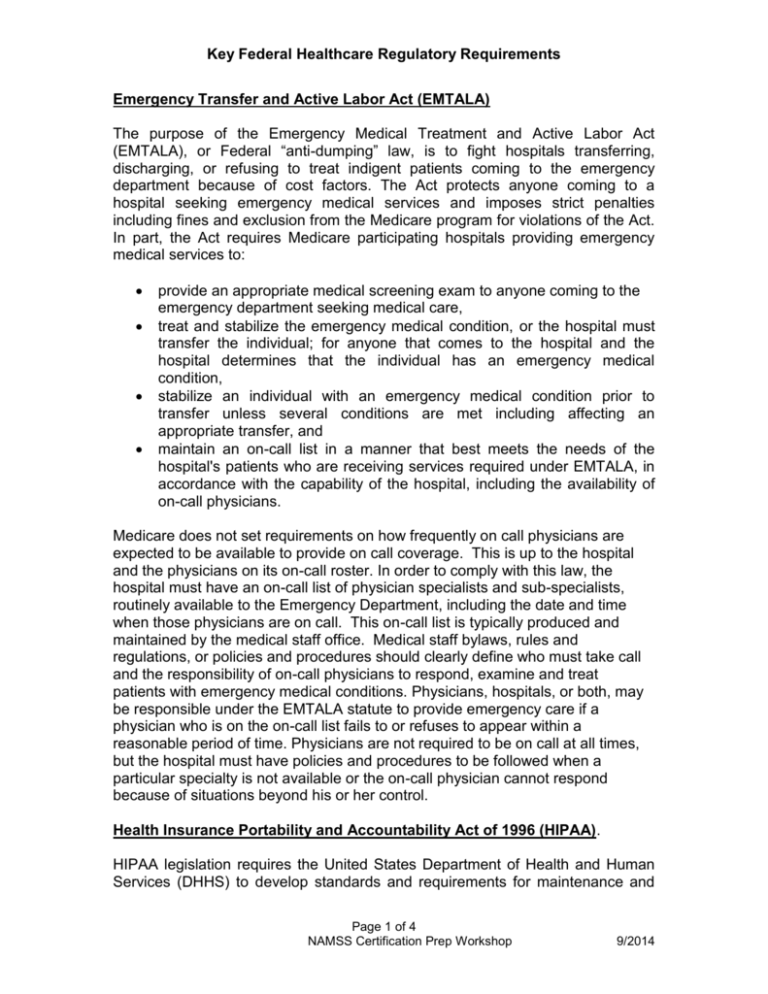
Key Federal Healthcare Regulatory Requirements Emergency Transfer and Active Labor Act (EMTALA) The purpose of the Emergency Medical Treatment and Active Labor Act (EMTALA), or Federal “anti-dumping” law, is to fight hospitals transferring, discharging, or refusing to treat indigent patients coming to the emergency department because of cost factors. The Act protects anyone coming to a hospital seeking emergency medical services and imposes strict penalties including fines and exclusion from the Medicare program for violations of the Act. In part, the Act requires Medicare participating hospitals providing emergency medical services to: provide an appropriate medical screening exam to anyone coming to the emergency department seeking medical care, treat and stabilize the emergency medical condition, or the hospital must transfer the individual; for anyone that comes to the hospital and the hospital determines that the individual has an emergency medical condition, stabilize an individual with an emergency medical condition prior to transfer unless several conditions are met including affecting an appropriate transfer, and maintain an on-call list in a manner that best meets the needs of the hospital's patients who are receiving services required under EMTALA, in accordance with the capability of the hospital, including the availability of on-call physicians. Medicare does not set requirements on how frequently on call physicians are expected to be available to provide on call coverage. This is up to the hospital and the physicians on its on-call roster. In order to comply with this law, the hospital must have an on-call list of physician specialists and sub-specialists, routinely available to the Emergency Department, including the date and time when those physicians are on call. This on-call list is typically produced and maintained by the medical staff office. Medical staff bylaws, rules and regulations, or policies and procedures should clearly define who must take call and the responsibility of on-call physicians to respond, examine and treat patients with emergency medical conditions. Physicians, hospitals, or both, may be responsible under the EMTALA statute to provide emergency care if a physician who is on the on-call list fails to or refuses to appear within a reasonable period of time. Physicians are not required to be on call at all times, but the hospital must have policies and procedures to be followed when a particular specialty is not available or the on-call physician cannot respond because of situations beyond his or her control. Health Insurance Portability and Accountability Act of 1996 (HIPAA). HIPAA legislation requires the United States Department of Health and Human Services (DHHS) to develop standards and requirements for maintenance and Page 1 of 4 NAMSS Certification Prep Workshop 9/2014 Key Federal Healthcare Regulatory Requirements transmission of health information that identifies individual patients. HIPAA regulations are divided into four Standards or Rules: (1) Privacy, (2) Security, (3) Identifiers, and (4) Transactions and Code Sets. The Privacy Rule sets standards for how protected health information (PHI) "in any form or medium" should be controlled. All healthcare organizations, including health plans and healthcare providers, are prohibited from using or disclosing health information except as authorized by the patient or specifically permitted by the regulation and must inform their patients/beneficiaries of their business practices concerning the use and disclosure of health information. The Identifiers Rule sets a standard for a national health care provider identifier (NPI) and requirements concerning its use. The purpose of the National Provider Identifier (NPI) is to uniquely identify a health care provider in standard transactions, such as health care claims. NPIs may also be used to identify health care providers on prescriptions, in internal files to link proprietary provider identification numbers and other information, in coordination of benefits between health plans, in patient medical record systems, in program integrity files, and in other ways. HIPAA requires that covered entities (i.e., health plans, health care clearinghouses, and those health care providers who transmit any health information in electronic form in connection with a transaction for which the Secretary of Health and Human Services has adopted a standard) use NPIs in standard transactions. The NPI is a 10-position, intelligence-free numeric identifier (10-digit number). This means that the numbers do not carry other information about healthcare providers, such as the state in which they live or their medical specialty. The Security Rule requires protection against unauthorized use or disclosure and requires processes to assure the integrity and availability of electronic PHI. It includes provisions for data backup, disaster recovery and emergency operations and conducting risk assessments and development of security plans to protect this information. The Transactions and Code Sets Rule addresses uniform electronic interchange formats. MSPs often deal with peer review issues that contain patient information, physician health information on applications, and patient complaints. Care should be taken not to disclose patient health information without obtaining appropriate consent and release. Patient Self-Determination Act This act requires that patients be allowed to participate in treatment decisions including the use of advance directives. Advanced directives are documents that allow a person to give directions about future medical care or to designate Page 2 of 4 NAMSS Certification Prep Workshop 9/2014 Key Federal Healthcare Regulatory Requirements another person(s) to make medical decisions if the individual loses decisionmaking capacity. Advance directives include living wills, durable powers of attorney for healthcare decisions, do-not-resuscitate (DNRs) orders, right to die, or similar documents expressing the individual's preferences. Sherman Anti-trust Act The Sherman Act provides: "Every contract, combination in the form of trust or otherwise, or conspiracy, in restraint of trade or commerce among the several States, or with foreign nations, is declared to be illegal". The Act also provides: "Every person who shall monopolize, or attempt to monopolize, or combine or conspire with any other person or persons, to monopolize any part of the trade or commerce among the several States, or with foreign nations, shall be deemed guilty of a felony.” Hospitals must take precaution not to violate the Sherman Antitrust Act when making medical staff appointment or privileging decisions, when making referrals to physicians or other health care practitioners, and when contemplating joint rate setting with other healthcare organizations. Healthcare Quality Improvement Act of 1986 The purpose of the HCQIA is to encourage good faith professional review activities. It includes provisions for expectation to protect hospitals and medical staff members participating on peer review committees from potential liability in the form of money damages due to legal action taken after the revocation of a physician’s hospital privileges. In addition, the Act includes standards for conducting professional review actions (hearings). It also created the National Practitioner Data Bank (NPDB) and specifies the querying and reporting requirements for the NPBB. Stark Law The Stark law prohibits a physician who has a financial relationship with an entity from referring Medicare or Medicaid patients to that entity for the provision of a designated health service. There are eleven categories of designated health services including but not limited to inpatient hospital services, home care, etc. Violation of physician recruiting laws and regulations can lead to serious penalties, including loss of a hospital's tax-exempt status and exclusion from Medicare and Medicaid. The Civil Rights Act of 1964 This law was enacted to “enforce the constitutional right to vote, to confer jurisdiction upon the district courts of the United States to provide injunctive relief against discrimination in public accommodations, to authorize the attorney General to institute suits to protect constitutional rights in public facilities and public education, to extend the Commission on Civil Rights, to prevent Page 3 of 4 NAMSS Certification Prep Workshop 9/2014 Key Federal Healthcare Regulatory Requirements discrimination in federally assisted programs, to establish a Commission on Equal Employment Opportunity, and for other purposes.” It applies to discrimination in the medical staff application process. Americans with Disabilities Act (ADA) The Americans with Disabilities Act (ADA) is a federal civil rights law that prohibits discrimination based on disability and bars discrimination against a qualified individual due to the disability. State and local court opinions vary regarding whether ADA applies only to employees only or includes medical staff members. It is up to individual hospitals to determine how the ADA applies to its privileging and credentialing processes. If the organization employs the medical staff member, the ADA applies. The Patient Safety and Quality Improvement Act of 2005 (PSQIA) Final Rule, 42 C.F.R. Part 3, was published on November 21, 2008, and is effective on January 19, 2009. PSQIA establishes a voluntary reporting system designed to enhance the data available to assess and resolve patient safety and health care quality issues. To encourage the reporting and analysis of medical errors within health care systems, PSQIA provides Federal privilege and confidentiality protections for patient safety work product. Patient safety work product includes patient, provider and reporter identifying information that is collected, created or used for patient safety activities. Civil money penalties (CMPs) may be imposed for knowing or reckless impermissible disclosures of patient safety work product. Patient Protection and Affordable Care Act The law puts in place comprehensive health insurance reforms. The act created a provision for Accountable Care Organizations (ACOs). An ACO refers to a group of providers and suppliers of services (e.g., hospitals, physicians, and others involved in patient care) that will work together to coordinate care for the patients they serve with Original Medicare (that is, those who are not in a Medicare Advantage private plan). The goal of an ACO is to deliver seamless, high quality care for Medicare beneficiaries. The ACO would be a patientcentered organization where the patient and providers are true partners in care decisions. ACOs create incentives for health care providers to work together to treat an individual patient across care settings – including doctor’s offices, hospitals, and long-term care facilities. The Medicare Shared Savings Program will reward ACOs that lower growth in health care costs while meeting performance standards on quality of care and putting patients first. Patient and provider participation in an ACO is purely voluntary. Page 4 of 4 NAMSS Certification Prep Workshop 9/2014

